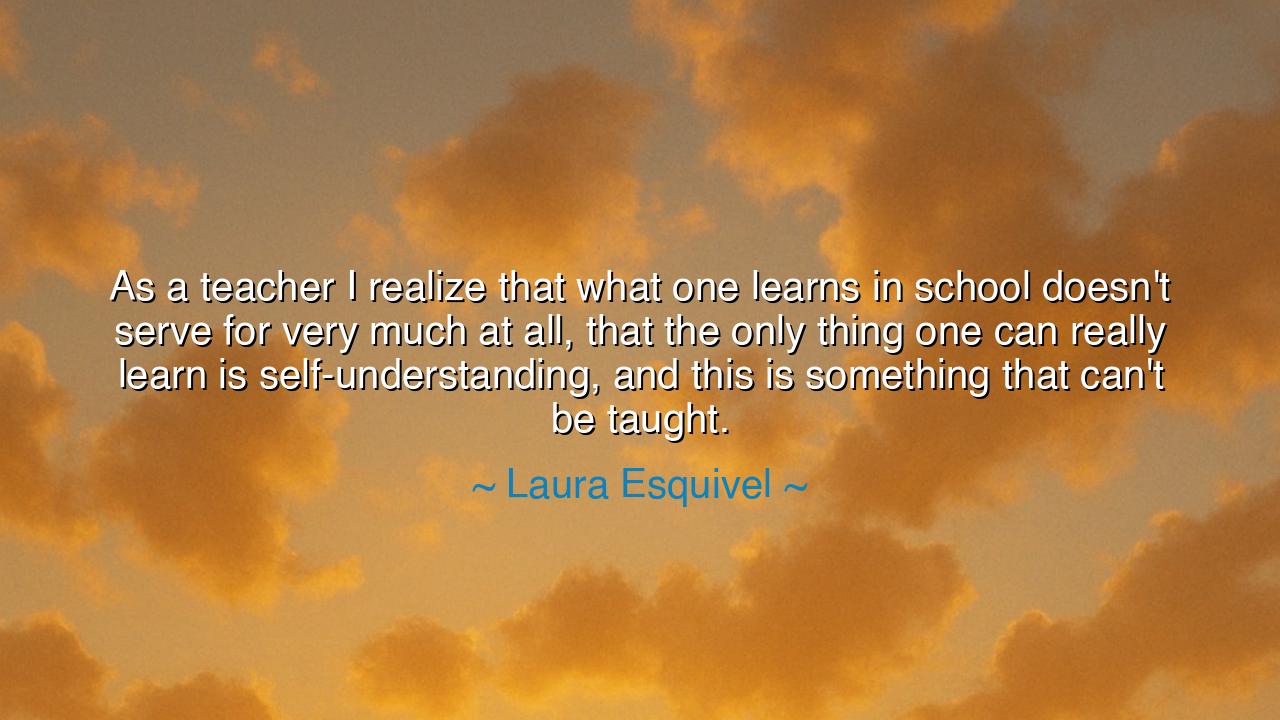
As a teacher I realize that what one learns in school doesn't
As a teacher I realize that what one learns in school doesn't serve for very much at all, that the only thing one can really learn is self-understanding, and this is something that can't be taught.






When Laura Esquivel declared, “As a teacher I realize that what one learns in school doesn’t serve for very much at all, that the only thing one can really learn is self-understanding, and this is something that can’t be taught,” she gave voice to a truth as ancient as philosophy itself. Her words reveal that the truest knowledge is not the memorization of dates, formulas, or rules, but the deeper wisdom of knowing oneself. Schools may prepare us to pass examinations or recite facts, but the task of understanding who we are—our desires, fears, and destiny—belongs to a higher and more mysterious kind of learning.
The origin of such an idea lies in the tradition of wisdom itself. The ancients inscribed upon the temple of Apollo at Delphi the command: “Know thyself.” It was not geometry or rhetoric, but self-knowledge, that was deemed the foundation of all wisdom. Esquivel, echoing this truth, reminds us that all teaching, however noble, is but a preparation for this greater task. A teacher may awaken curiosity, ignite the flame of thought, or offer guidance, but in the end, each soul must wrestle with itself, must confront its own truth. Self-understanding cannot be handed down like a textbook; it must be lived.
History bears witness to this reality. Consider Prince Siddhartha, who became the Buddha. Though he was schooled in the arts of war, governance, and philosophy, none of it brought him peace. Surrounded by teachers and scholars, he learned much but understood little of himself. It was only when he left the palace, sat beneath the Bodhi tree, and turned inward that he achieved enlightenment. His life shows the very meaning of Esquivel’s words: external learning may sharpen the mind, but only inner understanding awakens the spirit.
Even the great Socrates embodied this truth. He proclaimed himself the wisest of men not because he possessed knowledge, but because he understood the depth of his own ignorance. His dialogues with the youth of Athens were never lectures, but questions—tools to awaken in others the realization that wisdom begins with the soul’s honest reflection. Socrates could guide, but he could not force understanding; it had to be born within each listener. So too Esquivel tells us: self-understanding cannot be taught, only discovered.
The meaning of her words is not a dismissal of education, but a reframing of its purpose. The schoolroom is not an end, but a beginning. Facts and figures are scaffolding; the true building is the soul. When she says what one learns in school “doesn’t serve for very much,” she does not belittle knowledge, but places it in its proper role: useful, yes, but secondary to the grander pursuit of self-knowledge. For without self-understanding, all other learning risks being directionless, wielded without wisdom or compassion.
The lesson for us is both humbling and empowering. We must not rest satisfied with external learning, nor confuse intelligence with wisdom. True growth demands that we turn inward, that we listen to our hearts, confront our fears, and understand our motives. Self-understanding is the foundation upon which meaningful lives are built. A doctor who knows medicine but not himself may heal bodies yet harm souls; a ruler who knows laws but not himself may command nations yet sow ruin. Only the one who knows themselves can wield knowledge rightly.
Practically, we must cultivate this deeper form of learning. Take time each day for reflection, for silence, for meditation. Ask not only, “What have I learned?” but “Who am I becoming?” Teachers, parents, and leaders must guide others not merely toward skill but toward self-awareness, encouraging the young to look within and find their own truth. For the greatest lesson a teacher can give is not information, but the courage to seek one’s inner self.
Thus Laura Esquivel’s words endure as a beacon: the highest education is self-understanding, and it cannot be given from without but must arise from within. Schools may open the door, teachers may light the torch, but each soul must walk the path alone. To know oneself is the greatest knowledge, and in that knowing lies the wisdom to live, to love, and to lead.






AAdministratorAdministrator
Welcome, honored guests. Please leave a comment, we will respond soon